Tensions and contradictions
Early thoughts on the election, mostly about cost-of-living.
Welcome to the 22nd edition of Polycrisis Dispatch. Despite acute disappointment and travel, we have a lot to say – much of which we cut here, but will likely make it into the Polycrisis/Phenomenal World newsletter.
The election
The liberal international order, anchored by stable political majorities in the Western core, was already weakened by the Global Financial Crisis and Covid. Its legitimacy was further undermined by Ukraine and Gaza. This new American dispensation will have unspooling consequences for the global political order and all our futures. Hours after Trump’s win, the ruling three-party German coalition government, which had been teetering for months, finally collapsed. Further trouble in shaky G7 political coalitions in France, Japan, Canada is en route.
It’s the cost of living, stupid
The nature of Trump’s election victory was shocking. Trump did better in almost every county than he did in 2020, and the sheer breadth of constituencies that tilted Republican compared to 2020 is notable:
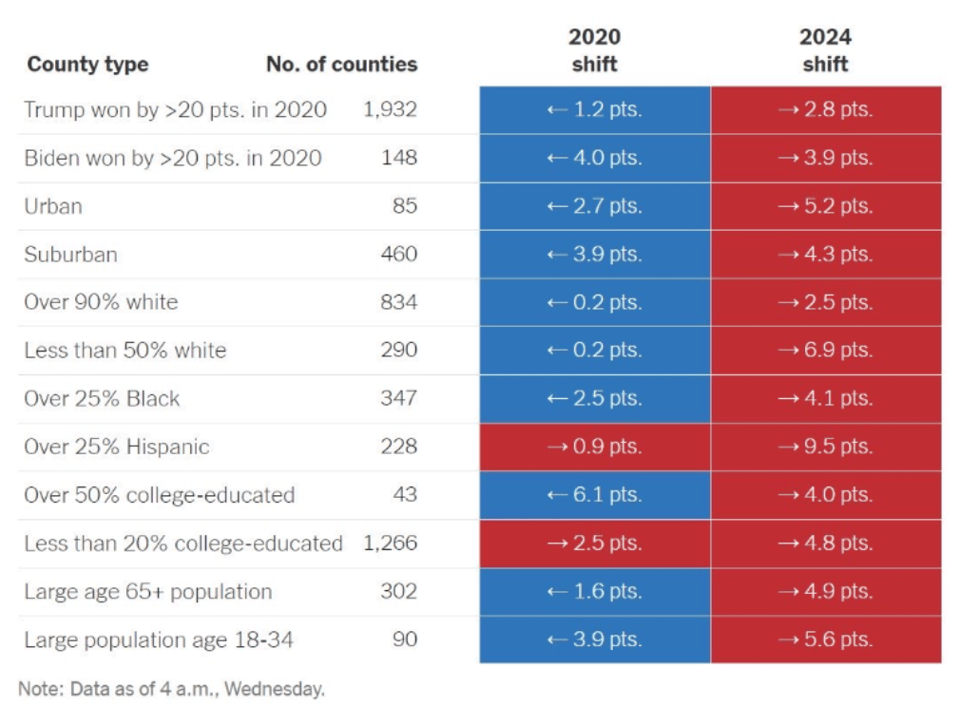
There are going to be many reasons behind this. And it’s a very tough year to be an incumbent. But it does seem that for a significant segment of US voters, the higher cost of living and other deteriorations in daily life overrode any fear of an openly fascist government. The fact that the US inflation rate had already fallen substantially would be immaterial for many people. The bit that most people care about is the now-permanently higher level of everyday prices:
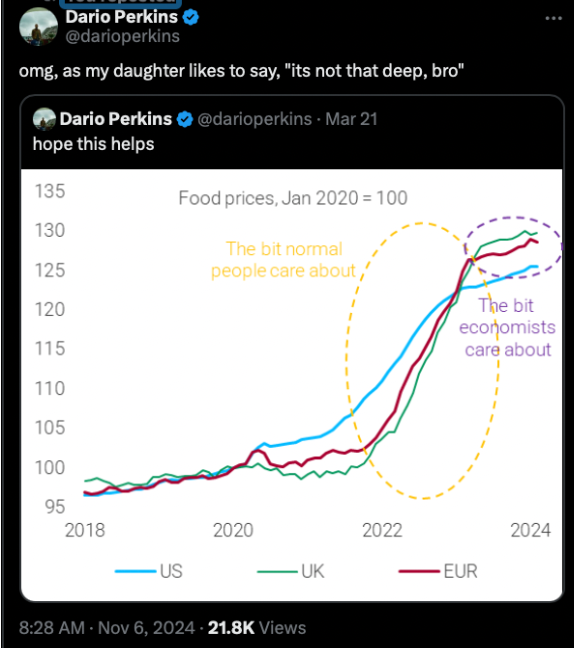
Of course, economists and policy elites could point out – truthfully – that things could’ve been much, much worse. But how could do you demonstrate a counterfactual? Flagship legislation like the Inflation Reduction Act (IRA), CHIPS and Science Act, and the Infrastructure and Jobs Act did not change the fact that rents and groceries were higher. And public understanding of the Biden administration’s legislation was famously poor. Even two years after it was signed into law, most people didn’t know about the IRA. Yale research found that while most were supportive of it when it was explained to them, they struggled to see how it would benefit “the economy” overall.
In any case, few of the IRA provisions could have demonstrably eased living costs in time for the 2024 election. The more expansive green and social welfare provisions of the original “Build Back Better” package were removed by the Manchin-Sinema centrist deficit-hawks in the Senate, leaving the Democrats precious little to run on – after dealing with supply chain squeezes, sellers’ inflation, and hiked interest rates, what was there that tangibly and immediately helped people to just get by?
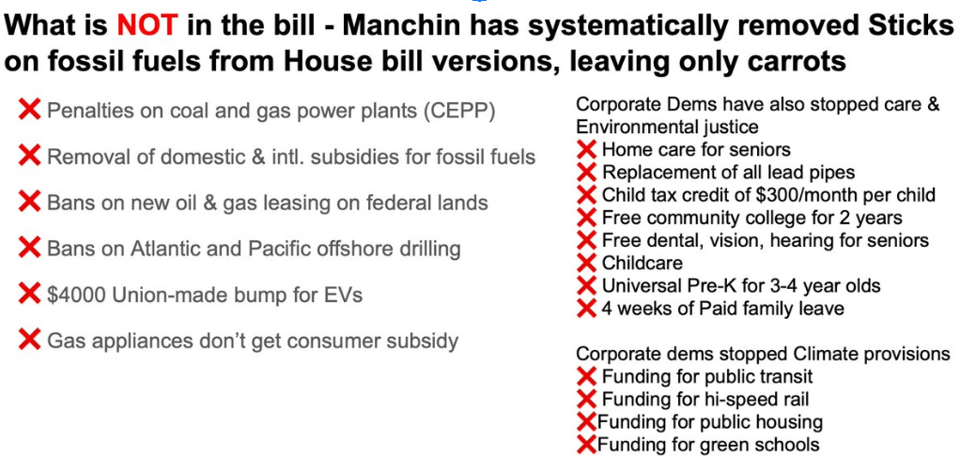
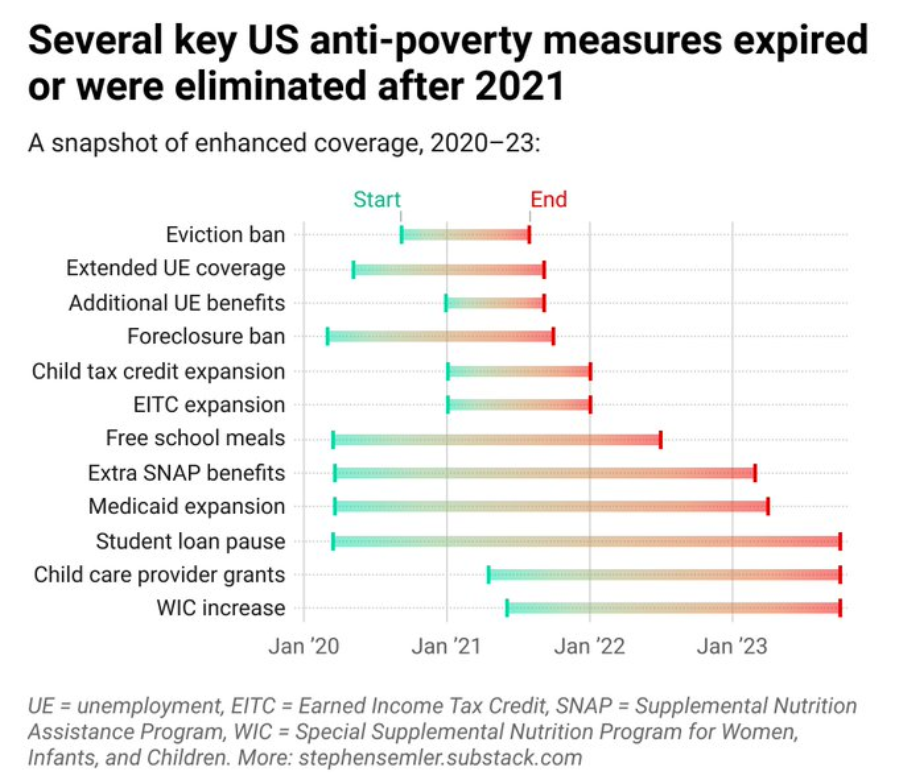
One danger now (among many) is that the orthodox view of both inflation’s causes and toolbox (exclusively hiking interest rates) will pounce on the American election as confirmation to reassert budgetary and central banking discipline.
Inflation is not caused by too much government spending. There are other ways to tackle inflation than simply bumping up official interest rates: intervening in real goods, or in their pricing. Policymakers well beyond the heterodox economics world are familiar with these ideas now, largely thanks to Isabella M. Weber and Employ America (both were featured in our first panel: The Geopolitics of Stuff). Plus, policymakers in multiple countries are already using tools like buffer stocks and price interventions to deal with Covid-related shocks and the Ukraine invasion (airlifting in baby formula; capping the price of natural gas, or Spain’s raft of unconventional energy price targeting).
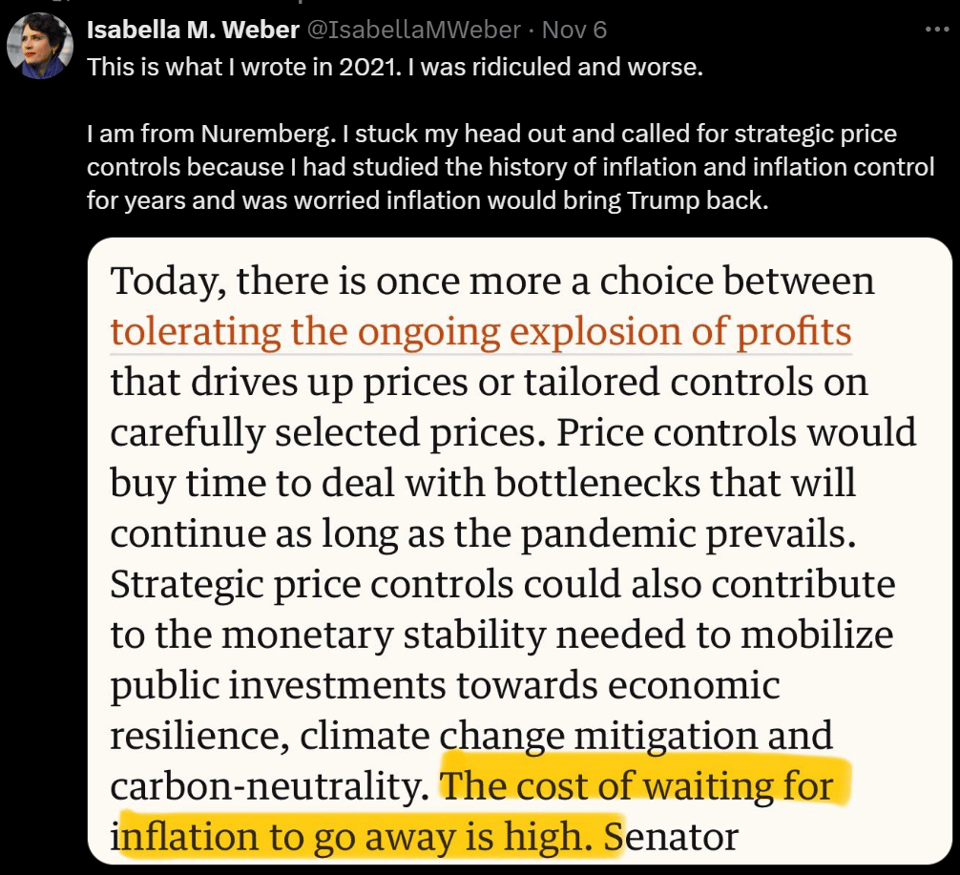
But the Democrats lost Congress in the 2022 midterm elections. So, no legislative or fiscal fixes could be offered there – meaning that the only policy to dampen inflation was the blunt hammer of the Fed hiking interest rates. A majority of people felt those higher interest rates immediately – car lease payments and consumer credit card payments shot up, and the disposable income of tens of millions was affected, as Larry Summers and co pointed out in their 2024 paper The Cost of Money is Part of the Cost of Living.
Never forget, though, that a large number of Americans aren’t just voting with their pocketbooks, and clearly want what Trump is selling – as Ed Luce puts it: “mass deportation of illegal immigrants, an end to globalization and a middle finger to the liberal elite and its … ‘woke’ culture.”
Climate and nature talks are carrying on
Next week is COP29 in Baku, Azerbaijan –- yes, another petrostate. Yes, it will still go ahead -– remember; Trump has been elected before and the process survived. One country has even submitted its “third generation” national emissions reduction plan already (the UAE; and, no, it is not great).
But the other COP ended last week in Cali, Colombia – the 16th “Biodiversity COP”. The meeting did not reach agreement on international redistributive “nature finance” amid disagreements over where the funds would even be held. But it did reach an agreement on “digital sequencing information”, which means big pharmaceutical companies will be expected to pay 0.1% of their total revenues, or 1% of profits, when they exploit useful DNA sequences from nature in making profitable pharmaceuticals, biotechnology, and food supplements. The US is not a signatory to the Convention on Biological Diversity (CBD) that this agreement rests on, nor is the DSI payment “enforceable”, but a clear and visible demand on an industry that frequently boasts high profit margins might be hard to wriggle out of.
What we’re reading:
“Eight years ago, when Trump first took office, climate policy was seen as fundamentally limited to the environment.... Now the stuff of clean energy — renewables, batteries, and EVs — are central to modern economic development and to geopolitics” - Robinson Meyer in Heatmap.
That’s the Dispatch for this week. We may be putting out a Phenomenal World Polycrisis newsletter next week to contain all our thoughts. In the meantime please do email us here (Tim) and/or here (Kate).
Add a comment: